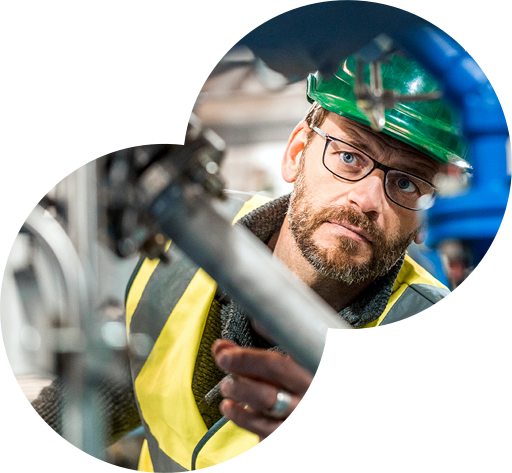Greater job satisfaction, better employability and less absenteeism:
Teamshape boosts your organisation
Want to know more? Call +31 (0)30-3050305 or send an email to info@teamshape.com

Electricians, plumbers, production managers, maintenance and installation engineers… there are nowhere near enough of them and the shortage in the industrial sector is only going to increase. The Dutch Economic Institute for Construction (EIB) expects that more than 100,000 new workers will be needed by 2023 in order to meet demand. According to the EIB, coronavirus will have little effect on this in the long term; after a contraction in 2020 and 2021, rapid recovery is likely to follow. And so the problems of high work pressure will continue to play a role, with high rates of absenteeism due to illness, attrition and dangerous situations.
In 2019 the Netherlands had a huge housing shortfall of around 250,000 homes. Existing houses must be made more sustainable and workers are also needed for other categories such as offices and infrastructure. Compounding the problem, clients are increasingly threatening to impose fines if the work is not completed on time. Some construction companies even regularly use employees who are not adequately certified, resulting in dangerous situations.
According to research conducted by the EIB, around half of operational technical and administrative staff experience a high to very high workload. This work pressure results in work-related stress, poor sleep, mental health issues and reduced work efficiency. Employers report that all of this leads to more mistakes being made in the workplace.
High work pressure is also reflected in absenteeism due to illness, which rose from 5.8% in 2019 to 6.7% in 2020. This makes absenteeism levels in industry the highest across all sectors. According to the Netherlands Institute for Social Research, the focus on long-term employability is not (yet) high on the agenda in the industrial sector. “In this sector, long-term healthy employability is something that needs attention. Staff loss due to illness or incapacity for work is high compared to other sectors.”

The EIB outlines three ways that the workload can be reduced: organising the work differently, discussing the issue and hiring more support staff. Employees indicate that reductions in work pressure are mainly due to a positive work environment. We developed Teamshape specifically to enable the discussion of important issues such as work pressure and increasing job satisfaction.
Teamshape is a suite of advanced self-learning digital solutions centred on the Teamshape Dialogue, a conversation that connects employee and team leader. As a result, team leaders are better equipped to support the employees’ development, which they in turn take ownership of. This promotes safety in the workplace, improves the work environment and increases employees’ employability. Find out more about Teamshape and the Teamshape Dialogue

The Teamshape Dialogue improves cooperation between employees and team leaders through connecting and open dialogues. Employees feel heard and taken seriously and team leaders gain insight into how to organise the work better and make it more enjoyable.
The results are tangible and measurable: absenteeism is reduced by up to 25% and staff turnover by as much as 11%. Improved communication doesn’t just make the work environment more efficient and pleasant; it also makes it safer. Thanks to Teamshape, accidents in the workplace are reduced by up to 22%. The digital dialogue and preliminary analysis are easy to use via an app for smartphone or tablet and this ease of use means that two to three times as many employees take part in the programme.
We introduced Teamshape at the Royal BAM Group, where we rolled out a change programme for 6,500 employees. We did this using an online application for safe and sustainable traffic participation. After a year, traffic incidents had fallen by no less than 22%. This did not go unnoticed – BAM was awarded the ‘Safe and Sustainable on the Road’ quality mark for its efforts. In addition, within two months of the start of the online programme the construction group had reduced its CO2 emissions by 3%.

TNO’s cost-benefit tool shows the productivity gains of improving long-term employability. It turns out that improving the team leader’s role and the quality of the dialogue can already mean a €257,000 productivity increase per 1,000 employees. All of the organisations that adopted the Teamshape programme’s guidelines in 2019 more than succeeded in achieving this.
Indicate that the dialogue has increased their motivation
Are more inspired to work on employability
Indicate that their relationship with the team leader has improved
Of the dialogues lead to increased motivation
Of employees want to develop their skills and be supported in doing so
Want to make an effort to improve working conditions

Want to know more? Call +31 (0)30-3050305 or send an email to info@teamshape.com